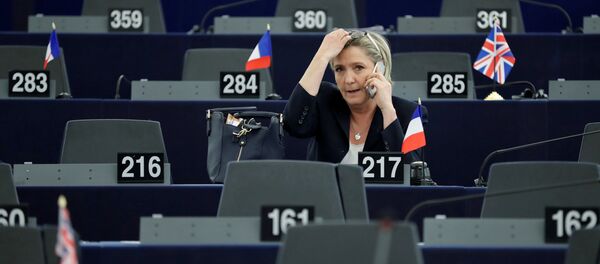Kristian Rouz — After the Eurozone economy outperformed the US in the first quarter, with a more optimistic outlook for the rest of this year, the European Central Bank (ECB) might start wrapping up its 2.3-trillion euro bond-buying package (quantitative easing, or QE) as soon as in September. The ultra-accommodative monetary policy has been criticized for being increasingly redundant against the backdrop of the improving economy, as its drawbacks and spillovers are gradually outweighing its limited benefits to economic growth.
However, the internal policy debate at the Frankfurt-based ECB might produce further delays to normalizing the monetary environment in the Eurozone.
During the April ECB policy meeting, the transcript of which was released on Thursday, chief economist Peter Praet said the regulator should be ‘particularly cautious' about revealing the next policy steps to the public.
Praet's concern is easy to understand, as any justified hint at a pending QE removal move produce significant market moves, including, but not limited to, a stock market rout and a capital flight for safe havens, including government bonds. This would increase the value of bonds, further hampering yields, which are already dismal after the years of weak economic recovery. Another concern would be a downward pressure on the natural interest rates, which, in the negative interest rate policy (NIRP) environment of the Eurozone, would baffle the investors and jeopardize growth prospects.
However, with the ECB protracting on any substantial policy moves for over two years, the regulator risks losing its credibility in the event that it fails to deliver policy updates in conjunction with the improving macro figures. Benoît Cœuré, another ECB executive board member, said the central bank should provide some verbal guidance to the market participants amid the improvements in the economy.
"The communication of the Governing Council has to remain in line with facts and an evolving reality," Cœuré said. "Too much gradualism in monetary policy bears the risk of larger market adjustments when the decision is eventually taken."
In other words, the lack of feedback from the ECB might produce sharp market fluctuations and loss of capital once the regulator announces it policy adjustments, be it in the form of gradual QE removal or a decision of base interest rates.
The ECB, according to the April meeting transcript, currently sees risks to economic expansion in the Eurozone as ‘broadly balanced', with political volatility settled, at least until the September elections in Germany.
"It was also remarked that a downward revision to the inflation outlook in the June 2017 Eurosystem staff macroeconomic projections could not be ruled out," the account of the Governing Council's meeting reads.
Lower inflation expectations, however, still allow for ECB policy adjustments, albeit very subtle and cautious ones. A gradual removal of the $2.3-trillion QE package would likely be the first priority, while the normalization of interest rates and ending of the NIRP is a matter likely to be addressed later.
The internal debate at the ECB produced a very cautious view of the regulator's communications strategy, with no policy moves planned for certain in the coming months. Removal of the QE might start in September, but there is no consensus within the ECB in that regard.
According to the ECB observations, the recent euro area GDP gains and the labor market tightening have produced increases in private consumption and contributed to an improved investment climate. Inflation, however, still underperformed, having dropped to 1.5 percent in March, which is below the ECB 2-percent target.
The Governing Council members agreed to "keep the communication on the Governing Council's monetary policy stance and its forward guidance unchanged" and to "reiterate its confidence in the effectiveness of its monetary policy measures in supporting growth and inflation."
However, ECB communication will remain cautious because the years of ultra-accommodative policies have rendered the markets and the broader economy particularly sensitive to policy changes.
"A premature and unwarranted tightening of financial conditions could put the prospects of a sustained adjustment in inflation towards the (2-percent target) at risk," the Governing Council said.
Thus, the ECB took a rather weighted and a compromise approach to policy adjustment and communication. This means that the regulator might start tightening the Eurozone monetary conditions this year, but that it is likely to happen extremely cautiously and in the absence of any sign of fair warning.





